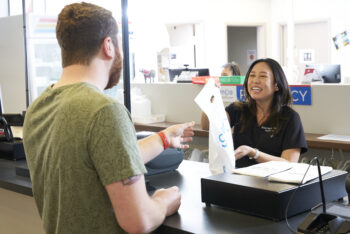What is medication-assisted treatment and how can it help the people you serve?
Did you know that an estimated two million people are living with opioid use disorder (OUD) and only 20% are receiving the proper treatment?1 OUD can be a life-threatening chronic health condition; however, it’s also considered treatable with the help of medication-assisted treatment (MAT) programs. MAT is a term used to describe the use of medication, along with other supports, to treat opioid, tobacco or alcohol use disorder.2 MAT pairs nondrug therapies, such as counseling or cognitive behavioral therapy, with an FDA-approved medication to treat OUD. Each medication differs in the way it works to relieve the symptoms of opioid withdrawal and/or to block the effects of opioids. MAT is quickly becoming the gold-standard of treatment for people living with OUD, but there are still myths associated with MAT programs and what they mean for patients.
3 facts about medication-assisted treatment
-
MAT is a “whole patient” approach
MAT programs utilize FDA-approved medications in conjunction with other support mechanisms to provide a holistic approach to combatting opioid use disorder. Patients enrolled in an MAT program also receive counseling and medical, educational, vocational, or other therapy services that are designed with each patient’s specific needs in mind.3
-
MAT reduces the need for inpatient detoxification services
MAT provides a more comprehensive program of medication and therapies when compared to inpatient services. Without the need for disruptive inpatient behavioral health or substance use disorder services, individuals in MAT programs display higher treatment retention rates and are able get back to a self-directed life more quickly, including the ability to gain and maintain employment.
-
MAT helps make recovery possible
More than 1.27 million Americans are currently receiving medication-assisted treatment. MAT can help make the process easier and significantly increases the chances for a successful, long-term recovery by taking a “whole patient” approach.4
3 myths about medication-assisted treatment
-
MAT increases the risk of overdose
Studies have shown that individuals who were not receiving MAT had over eight times the risk of overdose mortality when compared to those who were receiving MAT.5
-
MAT is only effective in the short-term
MAT can be used in both short-term and long-term treatment for those living with OUD. Depending on the individual and the circumstances of their recovery, MAT can be safe and effective for months, years or even a lifetime.6
-
MAT simply trades one addiction for another
All medications used in MAT programs are approved by the FDA and are safe and effective when taken as prescribed by a doctor. These medications help to reduce the cravings and withdrawal symptoms individuals experience as a result of OUD and are combined with other support mechanisms to constitute a “whole patient” approach.
Have questions?
Interested in learning more about medication-assisted treatment and how it can help the people you serve? Let’s connect. Fill out the form below and we’ll be in touch.
"*" indicates required fields
1.Advancing pharmacological treatments for opioid use disorder (ADaPT-OUD). (2018, December 18). NIH. 2. Medications for substance use disorders (2023, February 21). SAMHSA. 3. Medications for substance use disorders (2023, February 21). SAMHSA.4. Get the facts: Medications to treat opioid use disorder (Neighborhood Access to Help). 5. Factors associated with opioid overdose during medication-assisted treatment. (2021, July 21). Harm Reduction Journal.6. Medications, Counseling and Related Conditions (2023, January 5). SAMSHA.






